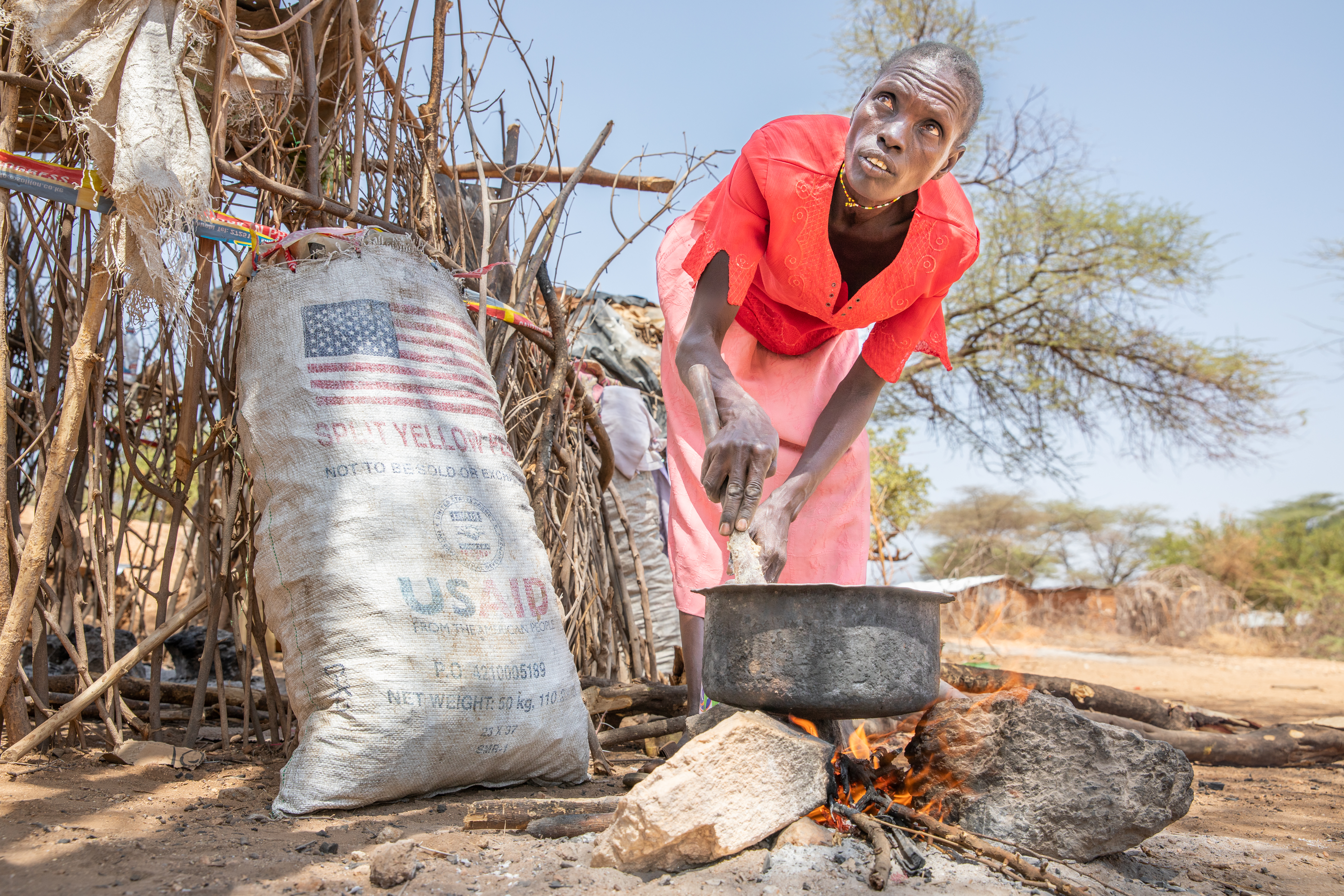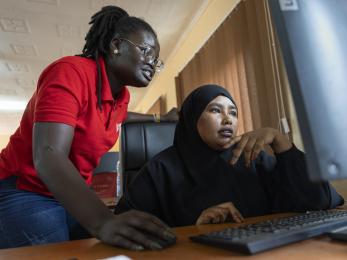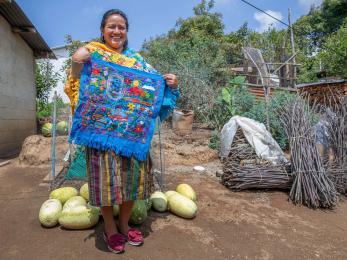Meet Sarmila: Overcoming challenges to stay in school
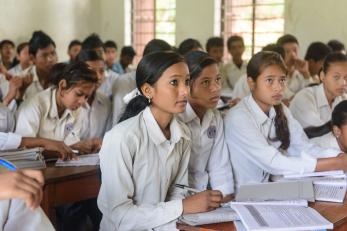
Meet Sarmila Sarki, an ambitious 18-year-old from a small village in far west Nepal. No girl from the “untouchable” Dalit caste in Sarmila’s village has ever passed the 10th-grade graduation exam. Sarmila plans to be the first.
As the top student in her class, Sarmila has a good shot at it — and she doesn’t plan to stop there. “I have many big dreams after the exam,” she says. “I want to serve my village and become a teacher.”
But Sarmila has three major obstacles to overcome: Her Dalit caste, her family’s poverty, and simply being a girl.
Because they are Dalit, Sarmila’s family faces deeply-entrenched discrimination on a daily basis. The Dalit caste is the lowest rung on the social hierarchy ladder in Nepal, and it's purely based on family lineage.

Her mother recalls that Sarmila wasn’t allowed to drink from the same cup of water as children from other castes. That discrimination is only now beginning to fade as younger generations like Sarmila’s reject the outdated custom.
Still today, 83 percent of Dalit women are illiterate, including Sarmila’s mom, who never attended school and was married at age 15. Inspired by her daughter's love of education, she’s started taking literacy classes and plans to learn to sign her name.
In a country where two-thirds of families live on less than $2 a day, Sarmila’s family is especially poor. Their mud-brick house with a straw roof is in a tiny village near the hot, dry border with India, almost 13 hours driving distance from Nepal’s capital, Kathmandu.

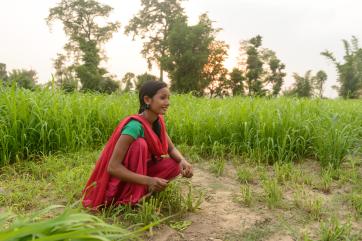
Sarmila’s family doesn’t own land — they rent a small plot to plant rice and vegetables to sell. It’s usually not enough, so her father travels to India for most of the year to work low-paying construction jobs. If they don’t earn enough to pay the rent, other expenses have to be cut — like school fees.
“After eighth grade, my parents told me I had to leave school because we were too poor to pay for the fees,” says Sarmila. Devastated, she asked her principal to talk with them.
Sarmila’s principal is a true champion for girls’ education in his village. And he’s had many conversations like this with parents over the 20 years he’s lead the village school.
“Most girls here [who drop out of school early] face many problems after getting married because of their illiteracy. They tolerate high levels of injustice and discrimination in their family and community,” he says.
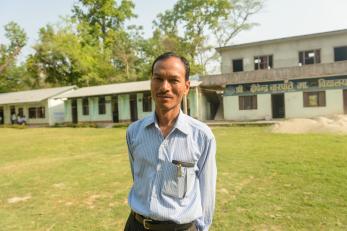
Seeing a special determination in Sarmila’s spirit, her principal not only convinced her parents to keep her in school, but he also covered her school fees this year and gave her an old bicycle to help her get to class.
“If Sarmila can continue her studies, she can be an example for the community,” he says. “I want her to be a teacher so others will be motivated to teach their daughters.”
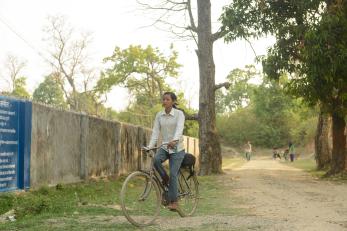
But before she can study each day, Sarmila must get through her long list of chores: gathering firewood to cook the family’s meals, pounding spices and chopping vegetables, cooking, and washing up after the meal is over. She also gathers rice from the paddy, weeds the garden, feeds the cow and looks after her niece and the neighbor’s kids.
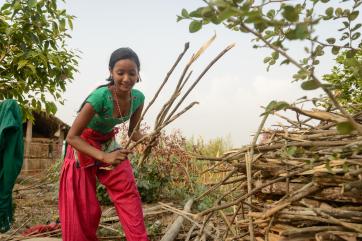
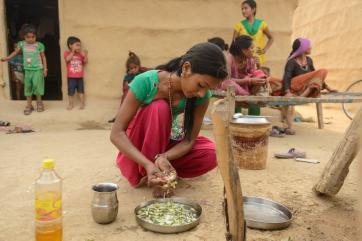
Sarmila flies through these chores to make sure she can snatch some evening light to do her homework — her family doesn’t have electricity for light.
Even if she can avoid the discrimination against her and jump over the hurdles of poverty, just being a girl sets Sarmila back.
In Nepal, like many parts of the world, education is seen as keeping girls from other pressing family needs, like childcare and chores. Few women work outside the home — a tiny six percent in rural Nepal.
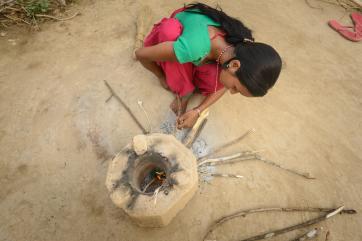
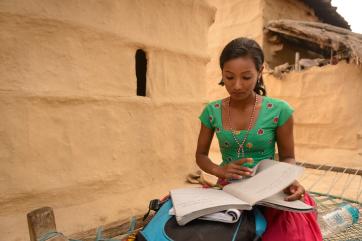
Instead, marriage is often the next step, and it’s a step that comes early. When a young man arrives at the doorstep with a proposal, it’s a custom for parents to accept. It's also an economic decision: The dowry her father pays her future in-laws represents the long-term cost of taking in a daughter. If women earned income, the tables would turn.
Most of Sarmila’s friends have already married — and dropped out of school.
Sarmila disagrees with this practice. “If you want your daughter to have a better life, let me study,” she tells her parents. “Let me be independent.”
Mercy Corps is working hard to help girls like Sarmila achieve their dreams.

We know just one extra year of secondary school can boost girls’ future wages by 15–25 percent. Our 150 after-school clubs are giving girls like Sarmila the support they need to continue attending school — help with homework, an enrichment curriculum focused on math, science and English, and a place to socialize with mentors.
And we’re supporting girls who can no longer attend school, too. Our girls clubs provide peer support, teach important life skills and even offer entrepreneurship skills so young women have the know-how to open small businesses, like tailoring or crafts.
We’ve created a fund that lets girls take out small loans to cover start-up costs and become established. The extra income they earn can provide young women with independence and negotiating power within the family.
To convince communities of the long-term benefits of educating girls, we’re empowering champions like Sarmila’s principal. We’re getting creative, too, hosting door-to-door conversations, school open houses, and street rallies.
For now, Sarmila is on track to pass the 10th-grade exam in 2016 and finish school. And that will open doors her mother never knew: a later marriage, earning a teaching certificate, and enjoying a better future where she can make her voice heard.
